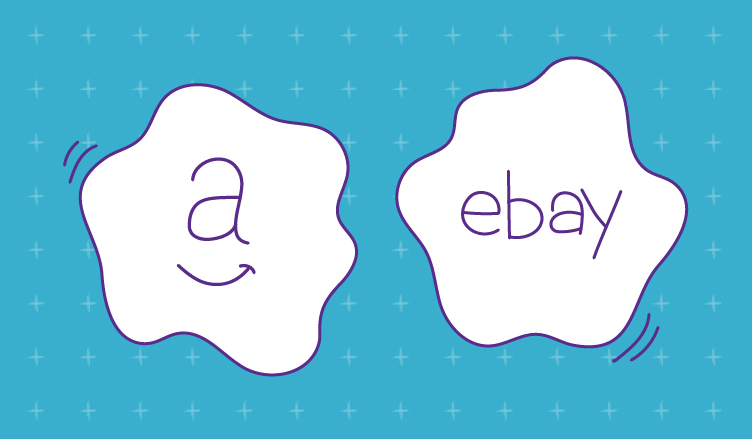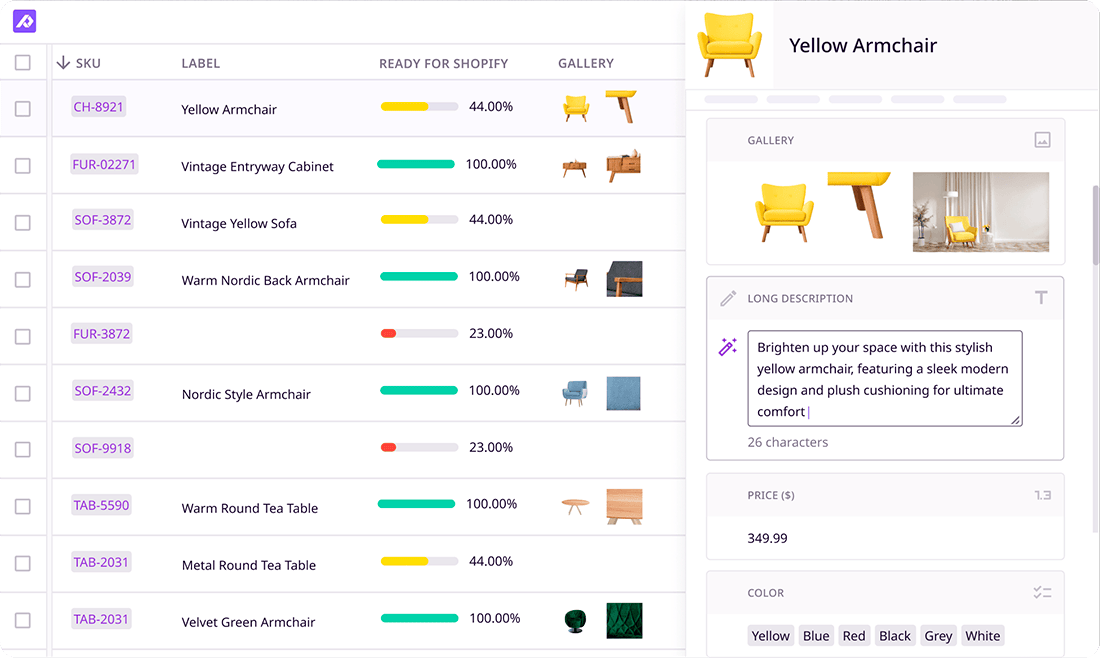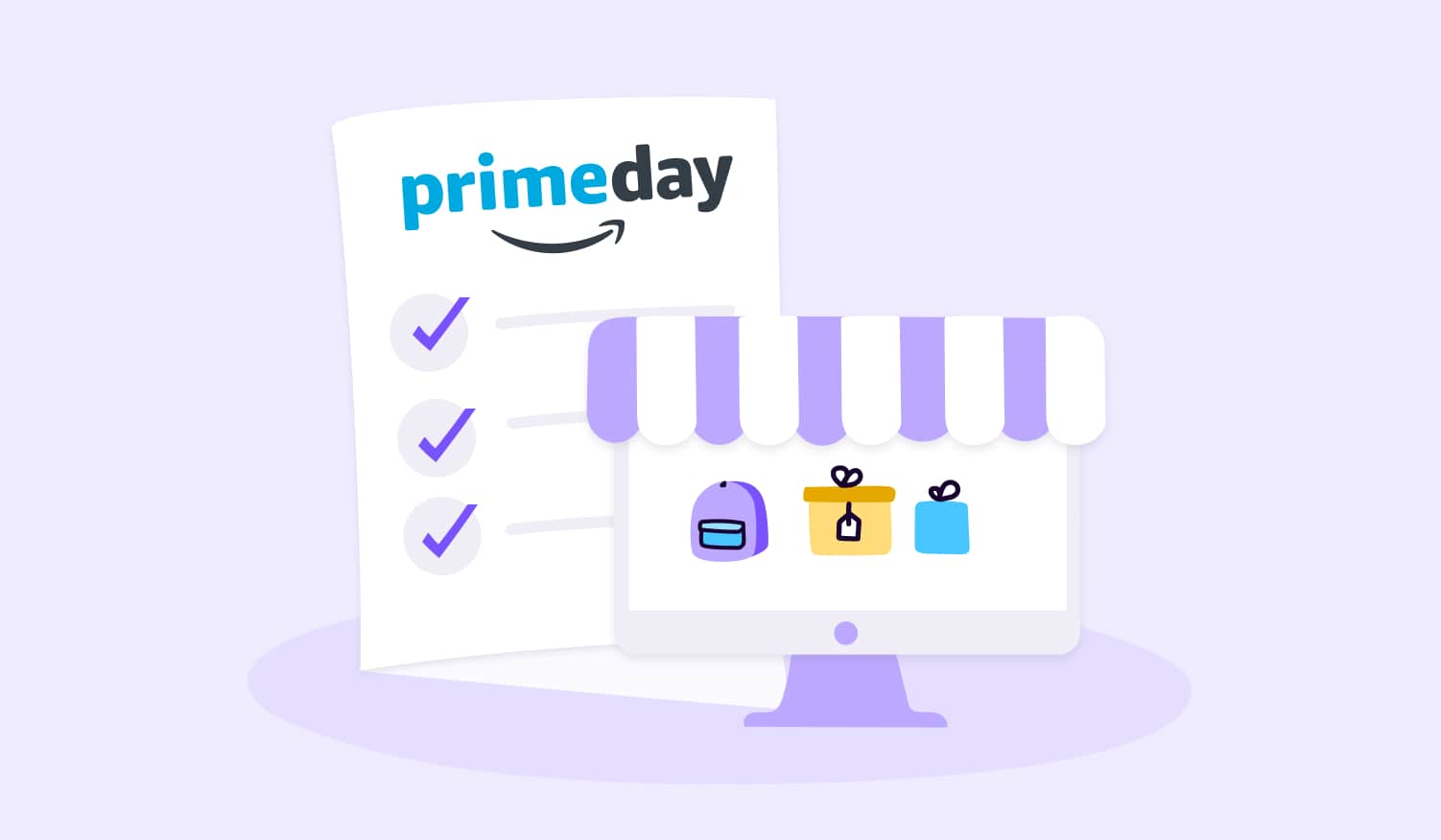Selling Online: Comparing Amazon vs. eBay

Keep the good stuff coming
Subscribe to our blog newsletter and get monthly content that helps you manage product data smarter.
No spam. Just real value.
For anyone interested in making some extra cash, selling products online is almost always the easiest decision for most. The opportunities are endless; from selling once-loved stuff in your house to old clothing you no longer wear or becoming a middleman for manufacturers.
Online selling platforms offer the easiest and most affordable way to reach buyers for different products. With numerous online eCommerce platforms to choose from, any seller can reach a buyer without needing a brick-and-mortar store or the hustle of setting up an offline store.
From Walmart to Shopify and Etsy to Alibaba, ecommerce sellers have many options when it comes to getting their products in front of their target market. Among the platforms available, Amazon and eBay have been around the longest and have been rated 1st and 3rd best performing ecommerce sites, respectively. For any business owner looking to increase sales and boost conversions, selling on one of these platforms should be the ultimate goal along with strengthening their sales intelligence.
However, how do you determine which one works best for your business and product?
Both Amazon and eBay are excellent marketplaces for sellers and come with advantages and disadvantages. Selling online can be a great side hustle, especially considering that today most people started working from home and the trend is even growing nowadays.
Here is a detailed look into both marketplaces and a comparison guide:
Pros and cons of selling on Amazon and eBay
Pros of selling on Amazon vs. eBay
Compared to eBay, most sellers enjoy a more significant profit potential on Amazon.
This is mainly because Amazon is ten times bigger than eBay, increasing the sale potential with less competition. Amazon also offers a highly convenient FBA, which solves the shipping and fulfillment headache for most sellers while allowing businesses to make huge profits.
When comparing this to Amazon, selling on eBay requires a business to invest heavily in customer support since the user base is more cost-conscious and high maintenance.
Pros of selling on eBay vs. Amazon
The greatest benefit of selling on eBay is the possibility of branding products. Sellers can design their online stores and customize their product lists to stand out from the crowd. eBay allows sellers to communicate better with their buyers by obtaining contact information and email addresses. The platform also allows you to sell anything they want, including used items. This makes it an ideal choice for small retailers or someone looking to offload surplus products.
The criteria for entry into the eBay marketplace are also low compared to Amazon. You do not need any real infrastructure of UPCs to sell on eBay, making it easy and quick to set up.
Cons of selling on Amazon vs. eBay
The greatest disadvantage of selling on amazon is that the ecommerce site owns the customer.
This means that consumers buying on the platform are less brand loyal and more interested in getting the best value for a product. This gives sellers a low opportunity of establishing a brand, with limited marketing opportunities outside the platform. To add, the kind of sellers on Amazon are also much more sophisticated since the ecommerce marketplace attracts larger brands, calling for more resources and larger budgets to be able to close sales on the platform.
Amazon takes policy enforcement seriously, which competitors can take advantage of. The policies make it easy for sellers to sabotage each other as a way of dealing with competition.
Cons of selling on eBay Vs. Amazon
The greatest disadvantage of selling on the eBay marketplace is that it is much smaller.
This results in 10 to 15 times less sale volume on the platform. Also, eBay does not offer fulfillment services. This means that the seller is responsible for the warehousing and shipping. The customer base on eBay is also considered to be far more economical than Amazon buyers, which significantly increases the use of customer support for each sale.
What types of products can you sell on Amazon vs. eBay?
To make the best decision when choosing between eBay and amazon for your online retail business, you first need to know what kinds of items can be listed on either of the platforms.
What can you sell on Amazon?
Generally, Amazon focuses more on selling new products. However, the website accepts used and refurbished goods in some categories if they meet the amazon renewed program requirements. Categories available to all sellers on Amazon include the following:
- Amazon device accessories
- Baby products
- Beauty products
- Books
- Electronics
- Books
- Clothing and accessories
- Cell phones
- Health and personal care
- Home and garden
- Home office essentials
- Musical instruments
- Office products
- Outdoors
- Software and computer games
- Sports
- Tools and home improvement
- Toys and games
- Video games and video game consoles
Additionally, there are other categories available to pro account sellers, including business products, automotive and truck parts, fine art, collectible coins, jewelry, industrial and scientific equipment, foodstuffs of any kind, professional services, luggage and travel accessories, computers, video recordings, sports collectibles, and watches.
What can you sell on eBay?
eBay is more open to second-hand goods sales. Generally, you can sell almost anything on eBay, whether new or used. However, eBay restricts the sale of some items and bans others.
- Some of the items restricted or banned from eBay include:
- Adult items – restricted to be only being sold to buyers who are 18 and older.
- Alcohol and drugs – eBay only allows the sale of wine and non-used and non-expired OTC medication.
- Animal and wildlife sale is banned.
- Clothing - sale of used socks, underwear, and some athletic equipment is not allowed.
- Cosmetics – used applicators, cosmetics products, and makeup sponges cannot be sold on eBay
- Coupons – unused valid coupon sales are restricted to 25 coupons a month worth less than $100.
- Any government-issued documents cannot be sold on eBay
- Electronic Items banned by the federal communications commission cannot be sold on eBay
- All foods must show an expiry date and a detailed note on how the seller keeps the food free from contamination during shipping
- Lock picks, and locksmith equipment sales are banned on eBay
- You cannot sell weapons on eBay, including guns and firearms
5 key factors to help you decide between the two
Sales and competition
In terms of competition between the two ecommerce sites, eBay favors the sellers more than amazon since it gives them more opportunities to get their product seen by a target audience that is likely to deliberate on the options available. Amazon is a highly competitive platform with hundreds of sellers offering products with sometimes ridiculously long and descriptive product names aiming to get the Buy Box spot. You have to present the best product information, and offer the best rates to win the Buy Box, which results in huge sales when successful. Even so, eBay provides a better experience for sellers compared to Amazon. (Note: your content will constantly change, and therefore, you should have a product listing optimization strategy to maintain the richest, most relevant product information at all times. These variations of content can be stored in a PIM tool that can be connected to eBay or Amazon)
Fees
How much fees you incur while selling on Amazon or eBay is an essential factor to consider.
Generally, eBay offers lower fees than amazon.
On Amazon, sellers can expect to pay for a professional seller status at $39.99 per month, a referral fee for every item sold, and FBA as an optional additional seller’s fee. The professional seller subscription gives you access to 100,000 free listings or more if your sales are regular.
The referral fees on amazon depend on categories, roughly standing at 15% with $0.30 for every item sold. Media products incur an additional closing fee of $1.80. eBay charges two kinds of seller fees. It charges an insertion fee of $0.35 on every listing and category, and a final value fee percentage is applied after an item sells. The final value fee percentage varies from one product to another. You can also expect to incur PayPal processing fees, even though it is not paid to eBay but to PayPal.
Comparing the two platforms, eBay is cheaper by an average of 2% after including the PayPal processing fees.
Traffic statistics
On average, an Amazon shopper spends 12 to 13 minutes more on the website and viewing products than buyers on eBay, who spend an average of 11 minutes. Also, amazon’s bounce rate is less than 25%, meaning at least 75% of potential buyers end up browsing through the site pages for longer. If you are looking for the best option based on statistics, amazon would be better for your product since buyers spend more time on the site than eBay.
Product promotions
Amazon is famous for lightning deals that allow sellers to place their items at a discount for 6 hours. This feature drives sales and makes customers come back for more. This turns customers into frequent buyers, which drives up the sales of items.
Running promotions is not always easy on eBay since the seller must ensure they offer the most competitive rates to attract buyers looking for affordable items. This makes amazon the better option for promoting sales through product promotions.
Feedback system
On both platforms, buyers and sellers can leave feedback on different transactions.
Amazon offers a sophisticated guarantee system to ensure buyers feel protected when purchasing items. Amazon’s policy keeps sellers in check by ensuring they provide quality items to avoid negative feedback and have their accounts suspended. It is also easier to get feedback removed on Amazon than on eBay. The latter is much more serious about feedback compared to Amazon. However, the feedback system is a disadvantage to buyers since most negative feedback scores are less noticeable to buyers. eBay does this to prevent buyers from making purchasing decisions based on reviews and feedback.
Of the two options, Amazon’s feedback policy makes it easier for buyers to factor in the comments about a seller when making purchasing decisions.
The final verdict – eBay or Amazon?
Both options offer different benefits to sellers and buyers.
The best choice depends on the type of products you want to sell and the customers you want to attract. Whether you choose to sell through Amazon or eBay, your strategy should involve researching the market for your product on both platforms and determining the kind of outcome you want. You can also try selling your products on both platforms as part of your research to see which one performs best. Whichever platform you choose, remember that your product information will differ according to the platform's requirements. If you stay consistent and meet each platform's expectations, you will reach millions of potential customers globally.

Lidia Hovhannisyan
Lidia S. Hovhan is a Digital Marketing expert and SEO guru. She contributes articles about how to integrate digital marketing strategy with traditional marketing to help business owners to meet their online goals. You can find professional insights in her writings.

What if your product data actually worked for you?
We’ll show you how Plytix helps you stop fixing data—and start using it.
Related posts
Keep the good stuff coming
Subscribe to our blog newsletter and get monthly content that helps you manage product data smarter.
No spam. Just real value.





Think others should see this?
Go ahead and share it.